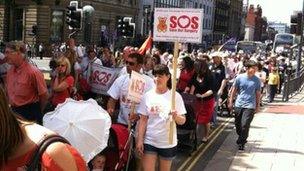High Court legal bid to save Leeds child heart surgery
- Published

A demonstration was held in Leeds last July by people opposed to the decision
The High Court is hearing a legal challenge over plans to end child heart surgery at Leeds General Infirmary.
An official review concluded last July that the hospital should stop operations so that care could be concentrated at fewer, larger sites.
Children will instead have to travel to Newcastle or Liverpool for surgery.
The Save Our Surgery group is seeking a judicial review of the NHS decision. It says the consultation process behind the plan was unfair and legally flawed.
The review, by the Joint Committee of Primary Care Trusts (JCPCT), ruled that children's heart units at Leicester's Glenfield Hospital and London's Royal Brompton should also stop surgery.
'Stopped breathing'
It proposed that surgery would continue at Great Ormond Street in London, Evelina Children's Hospital, also in London, Newcastle's Freeman Hospital, Birmingham Children's Hospital, Alder Hey in Liverpool and the Royal Children's Hospital in Bristol or Southampton General.
As part of the review process, each hospital was visited by a panel of experts and given a score based on its performance.
The Save Our Surgery (SOS) legal challenge centres on how those scores were worked out and the level of scrutiny they were subjected to.
Philip Havers QC, appearing for SOS, said today that nearly 600,000 people had signed a petition against the Leeds closure.
He told Mrs Justice Nicola Davies, sitting at London's High Court, the consultation process was unfair because the JCPCT denied those consulted the chance to question how the quality of their service was assessed.
Mr Havers said the Kennedy Panel, a group of experts set up to advise the JCPCT, had produced "sub-scores" measuring the quality of service under various criteria.
But the JCPCT chose only to look at the panel's total scores, and "bizarrely" refused to disclose the sub-scores to consultees, although it made them available "almost immediately" after it made its decision on how heart surgery services were to be reconfigured.
The result of not giving centres any clue how the panel scored various criteria was that centres were "shooting in the dark" when it came to consultation, he said.
The JCPCT, having refused to look at the sub-scores itself, was also "assessing in the dark", said Mr Havers.
Dinah Rose QC, appearing for the JCPCT, later told the court the suggestion the sub-scores were the key to understanding the assessments was "wrong".
Consultees were given enough information "to respond intelligently" in the consultation process, she said.
"Provision of the sub-scores is not going to give them extra information".
The judge suggested there had been "a paucity of information" emanating from the Kennedy Panel, but Ms Rose said she did not accept that.
"Leeds knows perfectly well what was being assessed and what decisions were being made," she said.
The hearing is expected to last two days.
- Published21 November 2012
- Published19 November 2012
- Published22 October 2012
- Published3 October 2012
- Published1 August 2012
- Published23 July 2012
- Published21 July 2012
- Published5 July 2012
- Published4 July 2012